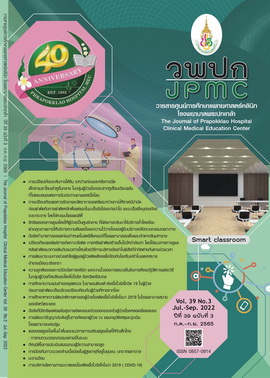Factors Affecting Family Resilience in Families with Stroke Patients
Main Article Content
Abstract
BACKGROUND: Stroke is a chronic disease that affects not only the patients, but also the family of the patients. This is because the chronic patients at home often needs long-term care, which is a crisis that affects the family members' psychological and physical health. Family resilience is a theory of increased family strength, finding positive meaning in the difficulties, and to withstand and rebound from adversity. When family caregivers have family resilience, families would be able to survive and advance, grow stronger and improve the quality of care for the stroke patients. Family caregivers can also take care of the stroke patients while being able to take care of themselves during the care of the patients.
OBJECTIVES: To study the factors affecting family resilience in families with stroke patients.
METHODS: This was a survey research, and the sample group comprised 176 family members of stroke patients from Sirindhorn National Medical Rehabilitation Institute. The sample size was determined under the assumptions of the structural equation analysis, and they were recruited by simple random sampling. The instrument was a general questionnaire, which measured family resilience, coping, and social support. The data were collected during September 2021-January 2022. Structural equation modeling (SEM) was used to analyze the data.
RESULTS: The results showed that the SEM was fit to the data (p=0.17; /df=0.75; CFI=1; TLI=0.99; RMSEA=0.04; SRMR=0.04). Social support and coping directly affected the family resilience and was found to be statistically significant (β=0.30 and 0.22l p<.001). However, social support indirectly affected family resilience and coping as a mediator (β=0.15; p<0.001). From the bootstrap methods to test the indirect effects, the results showed that coping was the partial mediator (95%CI=[0.06-0.24]).
CONCLUSIONS: The main factor which affected family resilience in the families with stroke patients were social support and coping; however, the role of coping was the mediator.
Article Details

This work is licensed under a Creative Commons Attribution-NonCommercial-NoDerivatives 4.0 International License.
References
World stroke organization. Annual Report 2019. [Internet]. 2019 [cited 2021 May 1]. Available from: https://www.world-stroke.org/assets/downloads/WSO_2019_Annual_Report_online.pdf
Department of Disease Control. Annual report 2020 Division of Non Communicable Diseases. Nonthaburi: Division of Non Communicable Diseases ; 2021.
Manacharoen W, Koolnaphadol P, Subwiraprakorn W. A study and development of family resilience of patients with cerebrovascular disease through assimilative integrate family counseling. Journal of Nursing Division 2016;44(1):62-81.
Gillespie D, Campbell F. Effect of stroke on family carers and family relationships. Nurs Stand 2011;26(2):39-46.
Kasemkitwattana S, Prison P. Chronic patients’ family caregivers: a risk group that must not be overlooked. Thai Journal of Nursing Council 2014; 29(4):22-31.
Kitila S, Thammakun T, Chankong W. Factors affecting quality of life of stroke patients at Sirindhorn National Medical Rehabilitation Institute. J Prapokklao Hosp Clin Med Educat Center 2019;36:105-14.
Walsh F. Strengthening family resilience. 3 rd ed. New york : The Guilford Press; 2015.
Fitryasari R, Nursalam N, Yusuf A, Hargono R, Lin EC, Tristiana RD. Development of a family resiliency model to care of patients with schizophrenia. Scand J Caring Sci 2021;35:642-9.
Kyriazos TA. Applied Psychometrics: sample size and sample power considerations in factor analysis (EFA, CFA) and SEM in general. Psychology 2018;9:2207-30.
Hair JF, Black WC, Babin BJ, Anderson RE. Multivariate data analysis. 8th ed. Hampshire: Annabel Ainscow; 2019.
Kim GM, Lim JY, Kim EJ, Kim SS. A model of adaptation for families of elderly patients with dementia: focusing on family resilience. Aging Ment Health 2018;22:1295-303.
Admadeli YP, Embu-Worho PM. Family and social environmental factors in the effects on family resilience: a systematic literature review. Advances in Social Science, Education and Humanities Research 2020; 530: 223-27.
Brivio E, Guiddi P, Scotto L, Giudice AV, Pettini G, Busacchio D, et al. Patients living with breast cancer during the coronavirus pandemic: the role of family resilience, coping flexibility, and locus of control on affective responses. Front Psychol [Internet]. 2021 [cited 2022 Feb 2];11:567230. Available from: https://www.frontiersin.org/articles/10.3389/fpsyg.2020.567230/full
Achilike S, Beauchamp JES, Cron SG, Okpala M, Payen SS, Baldridge L, et al. Caregiver burden and associated factors among informal caregivers of stroke survivors. J Neurosci Nurs 2020;52:277-83.

